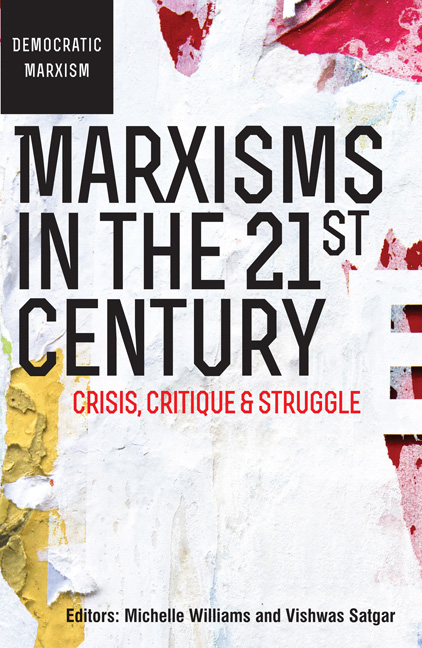Book contents
- Frontmatter
- Miscellaneous Frontmatter
- Acknowledgements
- Contents
- Acronyms and Abbreviations
- Introduction
- PART ONE DEMOCRATISING AND GLOBALISING MARXISM
- PART TWO MARXISM AND LEFT POLITICS
- Chapter 4 Notes on Critique
- Chapter 5 Marxism and Feminism: ‘Unhappy Marriage’ or Creative Partnership?
- Chapter 6 Marx and the eco-logic of fossil capitalism
- PART THREE CRISES OF MARXISM IN AFRICA AND POSSIBILITIES FOR THE FUTURE
- Conclusion
- Contributors
- Index
Chapter 5 - Marxism and Feminism: ‘Unhappy Marriage’ or Creative Partnership?
from PART TWO - MARXISM AND LEFT POLITICS
Published online by Cambridge University Press: 21 April 2018
- Frontmatter
- Miscellaneous Frontmatter
- Acknowledgements
- Contents
- Acronyms and Abbreviations
- Introduction
- PART ONE DEMOCRATISING AND GLOBALISING MARXISM
- PART TWO MARXISM AND LEFT POLITICS
- Chapter 4 Notes on Critique
- Chapter 5 Marxism and Feminism: ‘Unhappy Marriage’ or Creative Partnership?
- Chapter 6 Marx and the eco-logic of fossil capitalism
- PART THREE CRISES OF MARXISM IN AFRICA AND POSSIBILITIES FOR THE FUTURE
- Conclusion
- Contributors
- Index
Summary
In this moment of economic and ecological crisis a feminist anti-capitalist politics could generate a transnational solidarity that is larger and more powerful than anything we have yet seen. Such a politics requires both Marxism for its trenchant critique of capitalism and the class inequalities essential to it and feminism for its commitment to gender equality. Both require a commitment to anti-racism. In this chapter we trace the uneasy relations between Marxism and feminism showing the contributions each has made to the other and argue that the success of the current Marxist revitalisation hinges on a more equal relationship. This integration is best described as a socialist feminism based on the understanding that ‘the liberation of women depends on the liberation of all people’ (Rowbotham 1972: 11).
Feminism is both an intellectual project and a political movement, so its theoretical debates are also political and strategic. Feminists tend to be drawn together by their commitment to oppose women's oppression, but they are also engaged with different theoretical and political paradigms, differences that are sometimes obscured by the apparent unity of ‘feminist theory’. There are multiple ‘feminisms’. Typically, mid- to late twentieth-century feminism included several distinct political currents: liberal feminism aspiring to formal legal equality and access to equal opportunities with men; radical feminism, which assumed that unequal gender relations are the primary contradiction of social organisation and that women's oppression underlies all other inequalities; Marxist feminism, which assumed that women's liberation depended on overthrowing or dismantling capitalism; and socialist feminism which combined the historical materialism of Marxism with an analysis of gender-based inequalities.
In an influential intervention published over thirty years ago, Heidi Hartmann complained that the relationship between Marxism and feminism was marked by extreme inequality. She compared it to the marriage between husband and wife depicted in English common law at the time: ‘Marxism and feminism are one, and that one is Marxism’. She concluded that ‘either we need a healthier marriage or we need a divorce’ (Hartmann 1981: 2). Her hope for a healthier marriage was based on a conviction that each had strengths the other needed:
[W]hile Marxist analysis offers essential insight into the laws of historical development, and those of capital in particular, the categories of Marxism are sex-blind. Only a specifically feminist analysis reveals the systemic character of relations between men and women.
- Type
- Chapter
- Information
- Marxisms in the 21st CenturyCrisis, Critique & Struggle, pp. 116 - 142Publisher: Wits University PressPrint publication year: 2013



